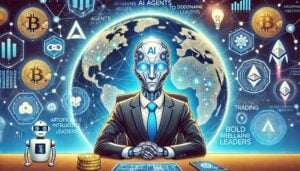According to Cointelegraph, industry experts foresee these autonomous systems playing a pivotal role in decentralized communities, despite challenges such as technical limitations, regulatory hurdles, and concerns over centralization.
AI Agents in Web3: A New FrontierAI agents, also known as agentic AIs, operate autonomously to achieve complex goals. These systems are already making waves in the digital economy, developing decentralized applications, launching tokens, and engaging in human-like interactions. By the end of 2025, blockchain networks could host over one million AI agents, according to a report by asset manager VanEck. Currently, around 10,000 AI agents collectively earn millions of dollars weekly through on-chain activities.
AI agents exceed 1 million on-chain interactions, generating $8.7 million in just 5 weeks. Source: VanEck
“The potential universe of AI agents interacting with crypto is infinite,” stated Matt Hougan, head of research at Bitwise. He added that the burgeoning market is set to witness numerous experiments, with a few groundbreaking applications likely to emerge as frontrunners.
Promising Use Cases for AI AgentsCryptocurrency staking is anticipated to be one of the earliest and most viable applications for AI agents. Staking involves locking up tokens to secure blockchain networks and earning a share of transaction fees. “AI agents participating in staking seems like a logical first step,” noted Hougan.
Ai16z (Eliza) price chart. Source: Brave New Coin
Projects like ai16z and Virtuals are already leveraging AI for innovative applications. ai16z’s agent, Eliza, autonomously manages an on-chain liquidity pool, reportedly generating annualized returns exceeding 60%. Similarly, Virtuals provides a platform for deploying AI agents on networks like Coinbase’s Base.
Overcoming ChallengesDespite their promise, decentralized AI agents face significant obstacles. Michael Casey, co-founder of the Decentralized AI Society, highlighted the risks of centralized systems dominating the AI space, warning, “Without decentralization, misaligned systems could lead to disastrous outcomes.”
Moreover, decentralized AI models currently lag behind centralized counterparts like OpenAI’s ChatGPT in areas such as speed and computational power. “Creating viable decentralized AI agents depends on developing solutions that ensure high-quality training data while safeguarding user privacy,” explained J.D. Seraphine, a Web3 AI developer at Raiinmaker.
Regulatory pressures also loom large. Casey pointed out that major players like OpenAI are lobbying for rules favoring their centralized models, potentially disadvantaging decentralized AI initiatives.
A Transformative ImpactAs the Web3 ecosystem evolves, the integration of AI agents could unlock unprecedented possibilities. Investors and developers alike are keen to explore this emerging field. Hougan summarized the sentiment succinctly: “It’s okay not to know exactly what will happen as long as you recognize the significance and position yourself for exposure.”
The rapid advancement of AI technology, coupled with the decentralization ethos of Web3, sets the stage for a transformative era. While challenges remain, the potential of AI agents to reshape digital economies is undeniable. By 2025, these autonomous systems could become integral to blockchain networks, driving innovation and efficiency across the ecosystem.














